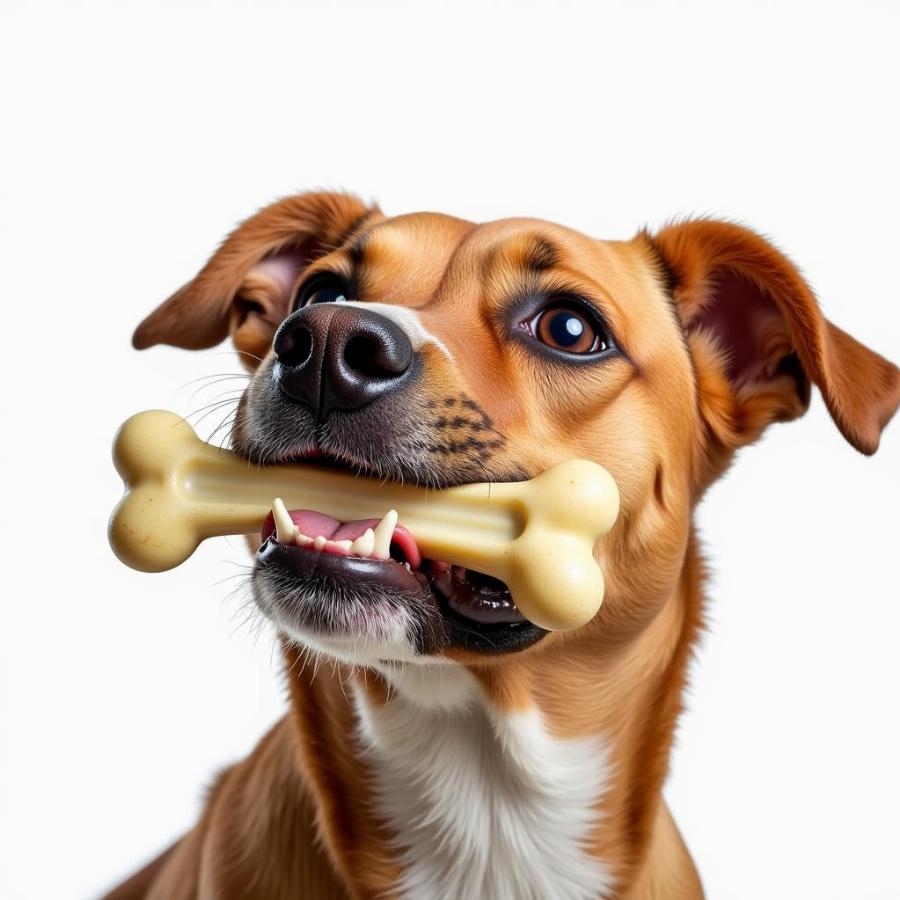Giving your dog a bone seems like a natural thing to do, but when it comes to T-bones, there’s a lot more to consider than meets the eye. Can dogs eat T-bones? The short answer is: it’s complicated. While the meat itself can be a tasty treat, the bone presents significant risks that every dog owner should be aware of. This article will delve into the potential dangers and benefits of T-bones for dogs, providing you with the knowledge you need to make informed decisions about your furry friend’s diet.
The Dangers of T-Bones for Dogs
While the meaty part of a T-bone can be appealing to dogs (and humans!), the bone itself is where the danger lies. The T-shape of the bone makes it particularly prone to splintering, especially when cooked. These sharp bone fragments can cause a variety of serious health problems for your dog.
Choking Hazards
A large chunk of bone can easily become lodged in your dog’s throat, obstructing their airway and causing them to choke. This is a life-threatening emergency that requires immediate veterinary attention.
Internal Damage
Swallowed bone fragments can cause significant damage to your dog’s digestive system. They can scratch or puncture the esophagus, stomach, or intestines, leading to internal bleeding, infections, and even peritonitis. Surgery is often required to remove these fragments and repair the damage.
Dental Damage
Chewing on hard bones, like T-bones, can fracture your dog’s teeth. This is especially true for older dogs or those with pre-existing dental issues. Broken teeth can be painful and require costly veterinary care.
 Dog Choking on T-Bone
Dog Choking on T-Bone
Are There Any Benefits to Giving Dogs T-Bones?
While the risks associated with T-bones are significant, there are some potential benefits to giving your dog the meat from a T-bone, provided it’s properly prepared and the bone is removed entirely. T-bone steak is a good source of protein and essential nutrients. However, these nutrients can be obtained from safer sources.
Nutritional Value
Beef is rich in protein, which is essential for building and maintaining muscle mass. It also contains iron and other essential minerals. However, it’s important to remember that these benefits can be obtained from leaner cuts of beef that don’t pose the same risks as T-bones.
Safer Alternatives to T-Bones
Instead of risking your dog’s health with T-bones, consider offering safer alternatives that can satisfy their chewing instincts and provide nutritional benefits.
- Raw Bones (from reputable sources): Raw bones, particularly recreational bones that are too large to be swallowed whole, are a better option than cooked bones as they are less likely to splinter. Always supervise your dog when they are chewing on any bone. Look for dog eating chicken bones for more information.
- Dental Chews: Dental chews are specifically designed to promote dental health and satisfy your dog’s chewing needs.
- Nylabones: These durable chew toys are made from a non-toxic nylon material and come in a variety of shapes and sizes.
Can Dogs Eat Cooked T-Bones? Absolutely Not!
Cooking makes bones even more brittle and prone to splintering. Never give your dog cooked T-bones. Even small fragments can cause serious internal damage. See our article on can dogs eat ribeye bones for more on this. If you’re looking for more specific advice on steak bones, check out our guide on can dogs eat a steak bone.
What to Do if Your Dog Eats a T-Bone
If your dog manages to eat a piece of a T-bone, monitor them closely for any signs of distress, such as vomiting, diarrhea, or difficulty breathing. If you notice any of these symptoms, contact your veterinarian immediately. It’s crucial to address this situation promptly to prevent serious complications. If you’re unsure what to do if your dog eats chicken bone, we have a detailed guide to help you through the process.
Conclusion
While the meaty part of a T-bone might seem like a tempting treat for your dog, the risks associated with the bone itself far outweigh any potential benefits. Prioritize your dog’s safety by avoiding T-bones altogether and opting for safer alternatives that can satisfy their chewing instincts without compromising their health. Remember, a healthy and happy dog is a priority! Always choose safe and appropriate chews for your furry companion.
FAQ
- Can puppies eat T-bones? Absolutely not. Puppies are even more vulnerable to the dangers of T-bones due to their smaller size and developing digestive systems.
- What kind of bones are safe for dogs? Raw bones, from reputable sources, that are too large to be swallowed whole are generally considered safer than cooked bones. Always supervise your dog while they are chewing on a bone.
- What should I do if my dog swallows a bone fragment? Contact your veterinarian immediately.
- Are there any other meats I should avoid giving my dog bones from? Yes, cooked bones from any animal should be avoided. Poultry bones, in particular, are extremely brittle and dangerous. See our resource on can dogs eat pork rib bones cooked for more.
- What are some good alternatives to bones for chewing? Dental chews, Nylabones, and other durable dog toys are excellent alternatives.
More Questions?
Have more questions about dog nutrition and safety? Check out our other articles on dog health and wellness at Beaut Dogs!
Beaut Dogs is your go-to resource for all things dog-related. We provide reliable, helpful, and in-depth information about the world of canines, from breed characteristics and care needs to health, nutrition, and training. When you need support, contact Email: [email protected] to get detailed and accurate answers from Beaut Dogs. Visit us at https://beautdogs.com for more!